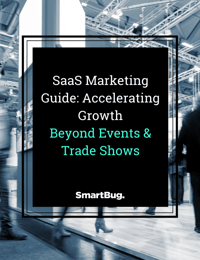
Beyond Events & Trade Shows: Affiliate & Referral Marketing Strategies for SaaS [PART 2]
August 27, 2020
By Kristen Deyo
If you’ve read part one of this two-part blog series, you’ve learned that the ability to connect with leads, acquire customers, and build your brand does not go away when trade shows and events go virtual—or are canceled altogether. In fact, SaaS marketers have some creative ways to help maximize lead and revenue generation during these uncertain times.
In part one of this series, we dug into the power of building upsell and cross-sell automation campaigns using email marketing. In this post, we dig into two other great ways SaaS marketers can generate leads: affiliate and referral marketing.
What Is the Difference Between Affiliate and Referral Marketing?
Much like upselling and cross-selling can be used interchangeably, so can affiliate and referral marketing. Understanding the difference can help you decide which one might be the right fit to help your SaaS organization maximize leads and revenue. Here’s a quick breakdown:
Affiliate Marketing
Sometimes the experts really do say it best, so I’m going to share this definition of affiliate marketing provided by BigCommerce:
“Affiliate marketing is the process by which an affiliate earns a commission for marketing another person’s or company’s products. The affiliate simply searches for a product they enjoy, then promotes that product and earns a piece of the profit from each sale they make. The sales are tracked via affiliate links from one website to another.”
Referral Marketing
Referral marketing, on the other hand, leverages customers who love what you do. I love this definition offered by Friendbuy, leaders in the referral marketing industry:
“Referral Marketing is a method of influencing customers to promote a brand's products or services to new customers, typically through incentives and offers. The foundation of referral marketing is harnessing the viral word of mouth—friends telling friends about great products and services they use via social media and email.”
Now that we understand the difference between the two, let’s dig into strategies and best practices for both.
Strategy 2: Affiliate Marketing
According to Web Market Support, an estimated 81 percent of brands and 84 percent of publishers leverage the power of affiliate marketing. In fact, affiliate marketing spend has increased just over 10 percent year over year, bringing total spend to $6.8 billion this year in the United States.
Affiliate marketing has the potential to be a powerful lead generation weapon. In order to get started with it, consider the following:
Proceed with Care
Before you dive into running affiliate marketing campaigns, you must do your research on the types of affiliate marketing programs that might be the right fit for your SaaS company. Some examples include:
- Search affiliates
- Bloggers/influencers
- Review sites
- Coupon sites
- Email marketing
Vigilantly ensure that you’re spending your budget the best way possible and not paying for low-value leads.
Understand Your Ideal Personas
In the previous blog in this series, we discussed the importance of segmentation and understanding who your ideal targets are. These principles also apply to affiliate marketing. Dive deeply into the personas you’re targeting in order to fully understand where and how they seek desired content—whether from blogs or some other user-generated medium.
Make Sure You Know What You’re Paying For
When setting up an affiliate program, you need to understand which result you are prioritizing and actually paying for. These can include:
- Impressions
- Traffic
- Leads
- Free demo trial users
- Paying customers
Determine which of these is most important and how much spend you’re willing to devote. Thinking about the spend for an affiliate program the same way that you thought about it for your trade show and/or events will enable you to meaningfully divert those funds into another lead generation channel.
Strategy 3: Referral Marketing
People trust the opinions and recommendations of their friends, colleagues, and peers. In fact, Nielsen suggests 92 percent of consumers trust recommendations from people they know. Furthermore, referrals are estimated to influence 20-50 percent of all purchasing decisions. But sometimes your customers need a little nudge to become advocates, which is why referral marketing campaigns are valuable.
When should you choose referral marketing? If you already have customers who love you and are willing to shout their praises from the rooftops, referral marketing is probably a great fit. Bonus points if you have customers who have already written you a review. Here are some tips for getting started with referral marketing:
Make Your Referral Program Easy to Find and Use
Create a path of least resistance for your customers. We recommend setting up a dedicated landing page for your referral program to help track conversions and other data. Don’t get overly complex—use straightforward forms that can be filled out in little time, and make it easy for customers to share with their friends via social media and/or email.
If You Never Ask, You Never Know!
Sometimes simply reaching out to customers for referrals can be as effective as your program’s other strategies. Be bold and ask your customers to refer you when the time is right (i.e., after they make a purchase, anniversary date, product/service milestone, and so on).
Offer Rewards That Are Worth Their While
Referral incentives are powerful motivators; thus, it’s important to make sure you are creating an incentive strategy that is worthwhile and propels your customers to refer you to their friends.
Through a combination of understanding customer sentiment, working with your customer success team, and the proper data, you can automate rewards and tailor them to ensure they are win-wins for the advocate and referee.
Leverage a Referral Marketing Platform
Not attending industry trade shows means that you may have dollars on the table to invest more seriously into referrals. Although you can leverage the best practices above, if you’re looking to scale your referral marketing program, using a referral marketing platform can be helpful.
If there’s one thing these uncertain times have taught us, it’s the importance of remaining agile as marketers. From cross- and upsell automated campaigns to affiliate and referral marketing, there are still plenty of opportunities for SaaS marketers and companies to maximize lead and revenue generation beyond trade shows and events. If you’re looking for additional tips to help, be sure to download our guide below.
About the author
Kristen Deyo was formerly a Director of Marketing Strategy at SmartBug based in Kingston, Ontario, Canada. She has 8+ years experience developing strategies for primarily B2B SaaS/technology companies and hyper-growth startups. She holds degrees from Queen's University (Cha'Gheill!) and the St. Lawrence School of Business. When not digitally plugged in, you can find her enjoying a good happy hour or planning her next adventure. Read more articles by Kristen Deyo.





















